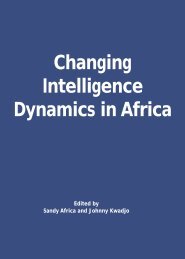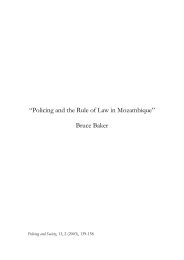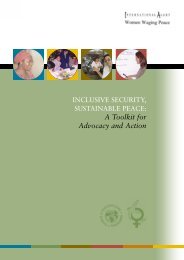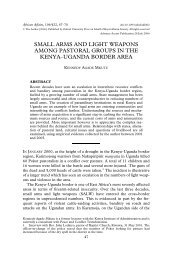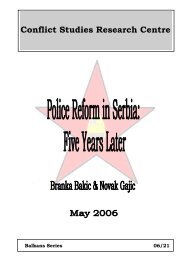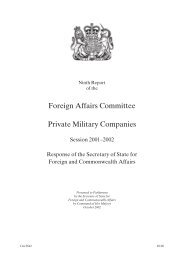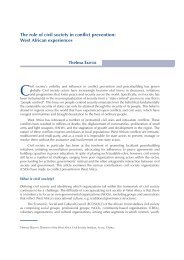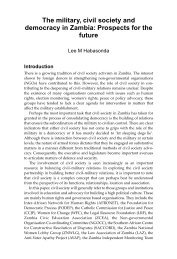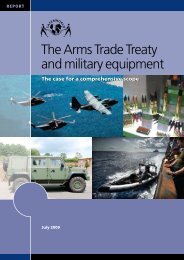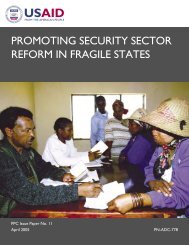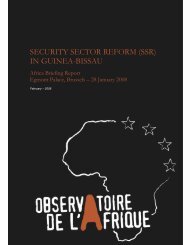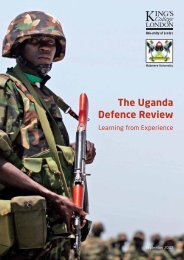AFGHANISTAN'S ELECTION CHALLENGES
AFGHANISTAN'S ELECTION CHALLENGES
AFGHANISTAN'S ELECTION CHALLENGES
You also want an ePaper? Increase the reach of your titles
YUMPU automatically turns print PDFs into web optimized ePapers that Google loves.
Afghanistan’s Election Challenges<br />
Crisis Group Asia Report N°171, 24 June 2009 Page 17<br />
IDLG head Jelani Popal (who is seen as close to<br />
Karzai), for allegedly failing to obtain his party’s assent,<br />
and later did not run, instead reportedly backing<br />
Karzai. 128<br />
Nearly all candidates have declared themselves independents,<br />
only six standing for very small parties. These<br />
include Shahnawaz Tanai who was defence minister<br />
under PDPA president Dr Najibullah before fleeing<br />
after a failed coup and now leads Da Afghanistan Da<br />
Solay Ghorzang Gond; and Abdul Latif Pedram, who<br />
heads Congra-i Milli, a party of primarily non-<br />
Pashtun leftist intellectuals, who also stood in 2004<br />
and took 1.4 per cent of the vote. In the interim he has<br />
had some legal difficulties after alleged involvement<br />
with Dostum in an attack on Turkman Mohammad<br />
Akbar Bai. Bai also stood – but was excluded in the<br />
vetting process – presumably not to win but for the<br />
same reason as Dostum and Hazara factional leader<br />
Mohaqqeq in 2005: to demonstrate strength within his<br />
ethnic bloc.<br />
128 Zubair Babkarkhel, “Ahadi vows support to Karzai in<br />
election”, Pajhwok Afghan News (PAN), 23 May 2009.<br />
129 Sayed Salahudin, “Key opposition groups to support<br />
Karzai in Afghan poll”, Reuters, 31 May 2009. Soon after this<br />
support was announced the presidential press office issued<br />
a clarification that Dostum, who had been in Turkey shortly<br />
after Akbar Bai was attacked in 2008 in what was widely<br />
believed to be a form of exile, “had all the rights of citizenship<br />
and can travel inside and outside the country like any other<br />
citizen”. Further he retained “the rights and privileges of his<br />
position” as chief of staff of the commander-in-chief of the<br />
armed forces, a largely ceremonial position he was believed<br />
to have been suspended from. Press release from the office<br />
of the spokesman to the president, 19 June 2009.<br />
As widely predicted, the National Front failed to survive<br />
the announcement of a candidate. When former<br />
foreign minister and leading Northern Alliance personality<br />
Abdullah Abdullah was chosen in April,<br />
Mohammad Qasim Fahim left the alliance to back<br />
President Karzai, claiming lack of proper consultation.<br />
Dostum’s Junbish also exited to form a coalition<br />
with Mohaqqeq’s Hizb-e Wahdat. Both parties are<br />
now backing Karzai. 129 Abdullah, like other serious<br />
contenders, has failed to secure high-profile vicepresidential<br />
candidates but has ensured an ethnic mix,<br />
with royalist Homayun Shah Asefi (a Pashtun who<br />
gained 0.3 per cent of the vote when standing in the<br />
2004 presidential election) and Shia surgeon Cheragh<br />
Ali Cheragh on his ticket. Former World Bank official<br />
and finance minister Ashraf Ghani Ahmadzai’s vicepresidential<br />
nominees are Kandahari landlord<br />
Mohammad Ayub Rafiqi and Hazara Mohammad Ali<br />
Nabizada. Ghani, a Ghilzai Pashtun who has spent much<br />
of recent decades in the West, has released an ambi-<br />
tious twenty-year strategy as part of a slick campaign.<br />
Negotiations on an electoral alliance are ongoing<br />
between Abdullah and Ghani. 130<br />
President Karzai has fallen back on the support of<br />
mujahidin factional leaders, selecting two as his vice<br />
presidential nominees, which also has the advantage<br />
of dividing his National Front opposition. Karzai has<br />
retained Hazara factional leader Karim Khalili and is<br />
adding Mohammad Qasim Fahim to his vicepresidential<br />
ticket, a particularly controversial choice.<br />
The international community lobbied hard in 2004 to<br />
ensure Fahim was not on the slate. 131 Overtures to<br />
Fahim appear to have included the appointment in May<br />
of an ally – previously removed as a police chief<br />
through interior ministry vetting – as governor of<br />
Parwan province. Karzai has also secured the endorsement<br />
of Barakzai strongman Gul Agha Sherzai, currently<br />
the governor of Jalalabad, who had publicly<br />
talked of standing as a presidential candidate in what<br />
appears to be a manoeuvre to obtain similar concessions.<br />
Other less prominent Pashtun contenders include<br />
Nasrullah Baryalai Arsalayi, the brother of the slain<br />
eastern mujahidin factional leader Abdul Haq; former<br />
attorney general Abdul Jabar Sabit; Wolesi Jirga deputy<br />
chairman Mirwais Yasini; and senior minister<br />
130 Peter Graff, “Karzai opponent says in talks to field single<br />
ticket”, Reuters, 17 May 2009.<br />
131 “Blood-Stained Hands: Past Atrocities in Kabul and<br />
Afghanistan’s Legacy of Impunity”, Human Rights Watch,<br />
6 July 2005, states of the civil war period: “General Fahim<br />
was chief of the Afghan intelligence service and controlled<br />
several military posts in Kabul, and was one of the chief<br />
commanders under Massoud…. Fahim controlled at least<br />
one of the military posts on Television Mountain throughout<br />
the period covered in this report, was involved in the planning<br />
of the Afshar campaign and took part in negotiations<br />
with Harakat commanders to gain their cooperation before<br />
the attack, and was directly involved in the Afshar attack”<br />
(p. 121). During the civil war, in February 1993, the Afshar<br />
campaign was a large-scale military effort by the Rabbaniled<br />
government, together with Ittihad troops, to capture the<br />
headquarters of Hizb-e Wahdat in the west of Kabul, having<br />
paid off a number of Harakat commanders. “There is<br />
credible and consistent evidence of widespread and systematic<br />
human rights abuses and violations of international<br />
humanitarian law during and after the Afshar operation,<br />
including intentional killing of civilians, beating of civilians,<br />
abductions based on ethnicity, looting and forced labour.<br />
The widespread and deliberate nature of these attacks suggests<br />
that some of the commanders involved in these abuses<br />
could be liable for crimes against humanity” (p. 74). Of<br />
Khalili, HRW says that he admitted taking Pashtun civilians<br />
prisoner and “more investigation is needed into Karim<br />
Khalili’s involvement in military decision-making and his<br />
control over Wahdat forces” (pp. 61-62).



